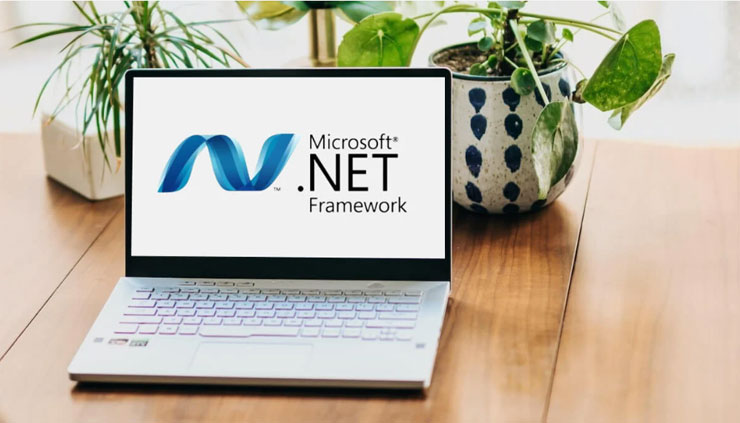Why .NET Remains the Backbone of Enterprise Software in 2025
Why .NET Remains the Backbone of Enterprise Software in 2025
Posted on: July 24, 2025 | Written by: Oleksandr Kyryk

In an industry obsessed with chasing shiny frameworks, there’s one technology stack that keeps doing the hard, thankless work behind the most complex enterprise systems — Microsoft .NET.
It doesn’t make headlines like Rust. It’s not the hottest topic on Hacker News. But in the world of real systems, real money, and real scale, .NET quietly dominates.
This isn’t a love letter. It’s a breakdown of why .NET is still the right choice — and in many ways, the only rational one — for serious software in 2025.
Performance Without the Startup Hype
ASP.NET Core is one of the fastest web frameworks in the world — consistently scoring at the top of independent benchmarks like TechEmpower. It handles high concurrency, supports async by default, and gives teams predictable performance in production.
This matters. Especially when you’re:
- Running real-time logistics dashboards
- Processing thousands of freight updates per hour
- Integrating with hardware (scanners, GPS, IoT sensors)
- Building enterprise-grade multi-user admin panels
.NET gives you the raw horsepower and the DX that makes building at scale sustainable.
Security, Identity, and Compliance: Built In
Modern enterprise systems must meet strict compliance standards — GDPR, ISO, SOC 2, HIPAA, and more. With .NET, enterprise-grade security isn't a plugin. It's baked into the framework:
- Native support for OAuth2, OpenID Connect, SAML
- Tight integration with Azure Active Directory
- Data protection, rate limiting, and CSRF out of the box
For enterprise clients, this isn’t optional. It’s table stakes.
And unlike DIY Node.js stacks or fragile microframeworks, .NET actually comes with security defaults that are sane.
Ecosystem Maturity That Reduces Risk
.NET has what most trendy frameworks don’t: a battle-tested, production-hardened ecosystem.
- ORM? Entity Framework Core is deeply integrated and rapidly evolving
- API? Minimal APIs in .NET 8 make it lean and expressive
- UI? Blazor for full-stack C# apps, or integrate Angular/React easily
- Tooling? Visual Studio, Rider, VS Code — take your pick
No duct-taping. No 15 third-party packages to do what .NET does out of the box.
When uptime matters and complexity is non-negotiable, maturity wins.
Built for Integration — Not Isolation
Logistics, manufacturing, healthcare — these aren’t greenfield SaaS startups. They live in messy ecosystems:
- SAP instances from 2009
- Custom warehouse software written in VB6
- FTP-based EDI providers
- Clients with 4 different CRMs
.NET plays nice with all of it. SOAP, REST, gRPC, file drops, MSMQ, RabbitMQ, you name it. You can build modern microservices and speak the language of legacy systems.
That’s not just convenience — it’s business survival.
AI-Ready With Microsoft-Grade Tooling
The rise of generative AI doesn’t leave .NET behind — it supercharges it.
With Semantic Kernel, ML.NET, Azure OpenAI SDK, and ONNX Runtime, you can:
- Build copilots into internal dashboards
- Run predictions on fuel efficiency or route delays
- Process documents with OCR and NLP
- Orchestrate LLMs inside enterprise workflows
All without leaving the .NET stack.
No need to glue Python microservices and pray they scale. You can train, deploy, and infer directly inside your enterprise platform.
Why Enterprises Still Hire .NET Developers in 2025
Despite the ever-growing list of languages and frameworks, demand to hire .NET developers remains strong — especially in logistics, supply chain, and manufacturing sectors where .NET’s integration strength and long-term support offer unmatched ROI.
Companies like TwinCore, with deep expertise in enterprise architecture and Microsoft technologies, emphasize the importance of choosing platforms that reduce risk, maximize interoperability, and provide predictable long-term outcomes — especially when building mission-critical systems.
The .NET Advantage for Enterprise Clients
When enterprise clients invest in .NET, they’re not betting on trendiness — they’re betting on:
- Predictable delivery timelines
- Secure and maintainable architecture
- Systems that integrate with the mess they already have
- Tech that scales without surprise bills
.NET delivers on all of that. With fewer unknowns, more control, and a mature team ecosystem.
The Future? More .NET, Not Less
With .NET 8, MAUI, Blazor WASM improvements, and tight AI integration, Microsoft’s ecosystem isn’t slowing down — it’s becoming more unified.
And while JS fatigue continues, .NET offers a language (C#) and platform that devs can build careers — and systems — on for decades.
Whether you’re building next-gen logistics automation or replacing a legacy monster, .NET remains the most complete, strategic, and enterprise‑ready platform on the planet.
About the author:
I have promoted major Internet platforms, such as ukr.net, rabota.ua, and have assisted the best web projects in their respective segments, such as Cosmopolitan, Meteoprog, FL.ru, and Rabota.ua.
I have also promoted content resources such as HOCHU, likar.info, ua-football.com and launched online sales for dozens of Internet stores in various niches, including automotive, tourism, windows, kitchenware, HORECA, sports equipment, and many others.
Currently, I am creating a service for distributing content on the Internet.
